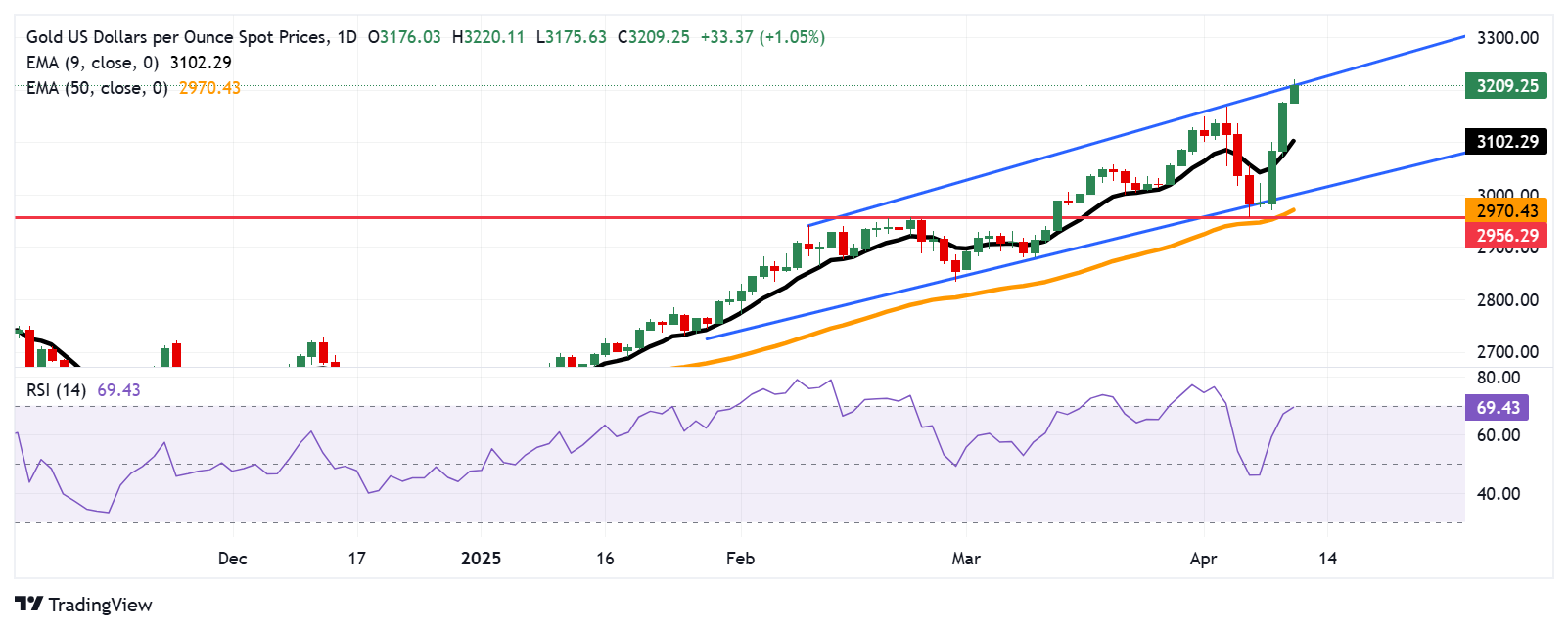
Gold price gains traction as a weakening US Dollar makes the metal more accessible to foreign currency holders.
The non-yielding Gold rises as softer US inflation data has strengthened expectations of Fed rate cuts as early as June.
The US Dollar continues to decline, weighed down by ongoing concerns over both global and domestic economic prospects.
Gold price (XAU/USD) continues to climb for the fourth straight session, hovering near a fresh all-time high of $3,220 per troy ounce, reached on Friday. The precious metal is gaining momentum as a weaker US Dollar makes it more affordable for foreign currency holders.
Investor demand for safe-haven assets like Gold has also surged amid rising US-China trade tensions. On Thursday, the US sharply increased tariffs on Chinese imports, imposing a new 125% levy on top of an existing 20% duty—raising the total to 145%. This aggressive move overshadowed President Donald Trump’s 90-day delay on higher tariffs for other countries, heightening fears of broader economic repercussions.
Further supporting Gold's rally, softer-than-expected US inflation data for March has fueled speculation about potential Federal Reserve rate cuts starting as early as June. Markets are now pricing in the possibility of up to a full percentage point in rate reductions by year-end. The US Consumer Price Index (CPI) showed headline inflation easing to 2.4% year-over-year—below the forecast of 2.6% and down from February's 2.8%. Core CPI, which excludes food and energy, rose by just 2.8%, also under expectations. On a monthly basis, headline CPI dipped 0.1%, while core CPI edged up 0.1%.
Daily Digest Market Movers: Gold price rises as US Dollar struggles amid economic concerns
The US Dollar Index (DXY), which measures the US Dollar against a basket of six major currencies, is trading lower at around 100.20 at the time of writing. The DXY continues to slide amid persistent concerns surrounding both the global and US economic outlooks. Investors are now turning their attention to the upcoming release of the US March Producer Price Index (PPI) and the preliminary Michigan Consumer Sentiment data, both due later on Friday.
In a move aimed at easing trade tensions, President Trump on Wednesday announced a 90-day pause on new tariffs for most US trade partners, lowering rates to 10% to create space for continued negotiations. “The 90-day pause is an encouraging sign that negotiations with most countries have been productive,” said Mark Hackett of Nationwide. “It also injects some much-needed stability into a market rattled by uncertainty.”
Minutes from the latest Federal Open Market Committee (FOMC) Meeting suggested that policymakers are nearly unanimous in recognizing the dual challenge of rising inflation and slowing growth, cautioning that the Federal Reserve faces “difficult tradeoffs” in the months ahead.
China’s CPI declined 0.1% year-over-year in March, following a 0.7% drop in February and falling short of expectations for a 0.1% increase. Monthly, CPI dropped 0.4%, worse than the previous month’s 0.2% decline and the forecasted figure. China’s PPI also contracted more sharply than expected, falling 2.5% annually in March versus a 2.2% drop in February and a projected 2.3% decline.
US President Donald Trump announced a 90-day pause on new tariff hikes for most US trade partners. While tariffs on China were still raised, the broader easing of trade tensions helped calm global economic fears, improving market sentiment and limiting the upside of the XAU/USD pair.
The latest Federal Open Market Committee (FOMC) minutes suggested broad concern among policymakers over the challenge of balancing inflation risks with slowing economic growth. Dallas Fed President Lorie Logan warned that unexpected trade measures could spur job losses and inflation, potentially forcing the Fed into a defensive stance. Weekly jobless claims also ticked up slightly to 223,000.
Gold price tests ascending channel’s upper boundary above $3,200
Gold price is trading near $3,210 on Friday, with daily chart indicators showing a persistent bullish bias as the pair tests to break above the upper boundary of an ascending channel pattern. However, the 14-day Relative Strength Index (RSI) maintains its position slightly below the 70 mark, suggesting a downward correction as soon as possible.
On the upside, the Gold price may explore the region around the psychological level of $3,300 level.
Gold price may find support at the nine-day EMA at $3,102. A break below this level could weaken the short-term price momentum and lead the put the downward pressure on the XAU/USD pair to test the lower boundary of the ascending channel at the $3,000 level.
XAU/USD: Daily Chart

* The content presented above, whether from a third party or not, is considered as general advice only. This article should not be construed as containing investment advice, investment recommendations, an offer of or solicitation for any transactions in financial instruments.


